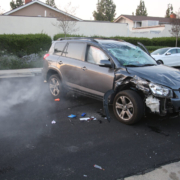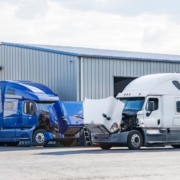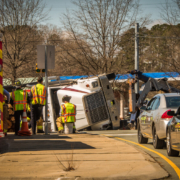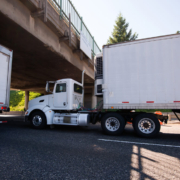Are Truck Accidents More Common in Rural or Urban Areas?
Truck accidents are a problem across the United States. They close down roadways, cause a significant number of fatalities, and leave thousands of victims injured every year. Figuring out trends in truck accident statistics can help drivers stay safe, avoid dangerous areas and times, and advocate for themselves after a crash.
One question that comes up time and time again is this: are crashes more likely to occur in rural or urban areas? Let’s take a look at the data, see what affects the data, and understand what that means for you and your safety. If you or someone you love has been hurt in a truck accident, call Bailey Javins & Carter at 800-497-0234.
What the Statistics Say
The NHTSA’s National Center for Statistics and Analysis is one of the most reliable sources of truck accident data. Their latest data comes from the year 2020, covering over 150,000 accidents that occurred across the United States. One section of data focuses specifically on what type of roadway accidents occur on, land use, and work zones.
In 2020, 45% of all fatal crashes took place in urban areas. This means that 55% of fatal collisions occurred in rural areas. This may come as a surprise to many—rural areas have far fewer cars than urban areas, so you might think the risk of a fatal accident might be lower.
The FMCSA has also conducted research on this topic. Their research found that 54% of all fatal crashes are in rural areas and over 25% are on interstate highways. This backs up the numbers put forth by the NHTSA.
Factors Affecting Rural and Urban Collisions
There are fewer people in rural areas, not to mention less traffic—so why are so many fatal truck accidents in rural settings? A number of factors contribute to this. To start, people often become complacent when driving in rural areas.
Everyone knows the roads tend to be quieter, which can cause drivers to “zone out” and relax a bit as they drive past the farms and fields. This makes it far harder to switch back into the right frame of mind when an obstacle or unexpected vehicle appears on the road. Seconds matter when it comes to preventing collisions and taking one or two seconds to focus back on the road could be fatal.
Rural areas tend to be far less well-lit than urban areas. This means that there are long stretches of road where drivers are surrounded by complete darkness. In this setting, it’s nearly impossible to avoid some level of fatigue. Fatigued driving is one of the biggest risk factors for serious accidents, so it should come as no surprise that fatigued drivers in rural areas are more likely to be involved in a crash.
Finally, rural roads may be less familiar to drivers than large interstate highways. Rural roads are known for having unexpected stop signs, twists and turns, and poorly marked roadways. These factors can be very confusing for drivers, and they may react too late or overcorrect when trying to get back on track.
Compensation for Truck Accidents
Truck accidents, whether on rural or urban roadways, are known for the massive amount of damage they can cause. If you’ve found yourself the victim of a truck collision, do not wait to seek compensation. Victims often suffer catastrophic injuries, are forced to replace totaled vehicles, and spend weeks or months off of work. These costs add up quickly.
Fortunately, tractor-trailers have much larger insurance policies than conventional passenger vehicles. This means that accident victims actually have a fighting chance at getting the money they need to recover from their injuries.
Once you’ve gotten the medical care you need after a crash, make it your top priority to find a truck accident lawyer in Charleston.
Start Your Claim with Bailey Javins & Carter
If you’re looking for an aggressive, experienced truck accident attorney, look no further than Bailey Javins & Carter. Our team works with victims from all walks of life after accidents turn their lives upside down. Set up your free consultation now by sending us a message online or calling us at 800-497-0234.










